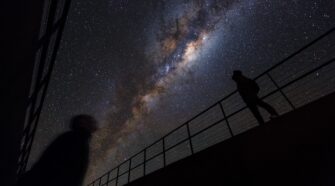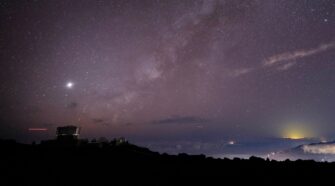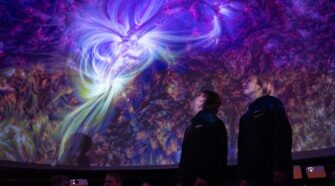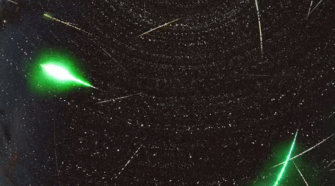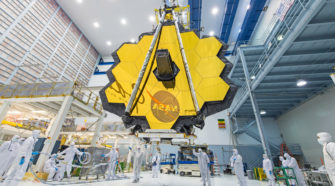Astronomy
Twinkling star reveals the secrets of plasma structures in our cosmic neighbourhood
With the most powerful radio telescope in the southern hemisphere, we have observed a twinkling star and discovered an abundance of mysterious plasma structures in our cosmic neighbourhood. The plasma structures we see are variations in density or turbulence, akin to interstellar cyclones stirred up by energetic events in the galaxy. The study, earlier this …
When you wish upon a star, is it already dead?
Deep in the Chilean Desert, astronomers witness a skyscape like few others on Earth. Credit: ESO/Luis Calçada/Herbert Zodet When you wish upon a star, Jiminy Cricket told us, your dreams come true. But according to an idea doing the rounds on social media, that may not be the case: According to astronomy, when you wish …
Another puzzling interstellar object spotted whizzing through solar system
Astronomers manning an asteroid warning system caught a glimpse of a large, bright object zipping through the solar system late on July 1, 2025. The object’s potentially interstellar origins excited scientists across the globe, and the next morning, the European Space Agency confirmed that this object, first named A11pl3Z and then designated 3I/ATLAS, is the …
Early visions of Mars: 19th-century astronomer used science fiction to imagine the Red Planet
Living in today’s age of ambitious robotic exploration of Mars, with an eventual human mission to the red planet likely to happen one day, it is hard to imagine a time when Mars was a mysterious and unreachable world. And yet, before the invention of the rocket, astronomers who wanted to explore Mars beyond what …
Brief history of how we brought the stars indoors to planetariums
Picture this: a small audience is quietly ushered into a darkened room. They gasp in awe, as a brilliant night sky shines above. They wonder – as many after them will do – what trickery has made the roof above their heads disappear? But this is a performance; the stars above an ingenious projection. For …
Rubin Observatory assembling the most complete time-lapse record of the universe
On 23 June 2025, the world will get a look at the first images from one of the most powerful telescopes ever built: the Vera C. Rubin Observatory. Perched high in the Chilean Andes, the observatory will take hundreds of images of the southern hemisphere sky, every night for 10 years. In doing so, it …
Why meteorites have less water than the asteroid bits returned by space probes
Much of what scientists know about the early solar system comes from meteorites – ancient rocks that travel through space and survive a fiery plunge through Earth’s atmosphere. Among meteorites, one type – called carbonaceous chondrites – stands out as the most primitive and provides a unique glimpse into the solar system’s infancy. The carbonaceous …
James Webb Space Telescope: How to send a giant telescope to space – and why
The James Webb Space Telescope is scheduled to head to space on Dec. 22, 2021. With it, astronomers hope to find the first galaxies to form in the universe, will search for Earthlike atmospheres around other planets, and accomplish many other scientific goals. I am an astronomer and the principal investigator for the Near Infrared …
Four astronomical discoveries from ancient Greece
The Histories by Herodotus (484BC to 425BC) offers a remarkable window into the world as it was known to the ancient Greeks in the mid-fifth century BC. Almost as interesting as what they knew, however, is what they did not know. This sets the baseline for the remarkable advances in their understanding over the next …
From the pyramids to Stonehenge – were prehistoric people astronomers?
Ever since humans could look up to see the sky, we have been amazed by its beauty and untold mysteries. Naturally then, astronomy is often described as the oldest of the sciences, inspiring people for thousands of years. Celestial phenomena are featured in prehistoric cave paintings. And monuments such as the Great Pyramids of Giza …


